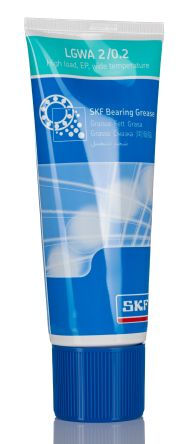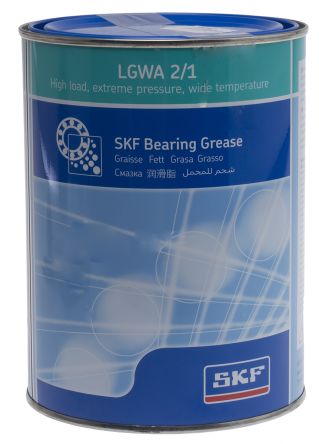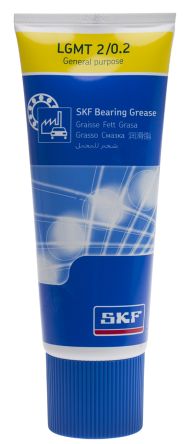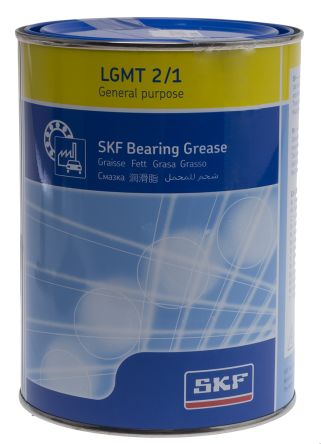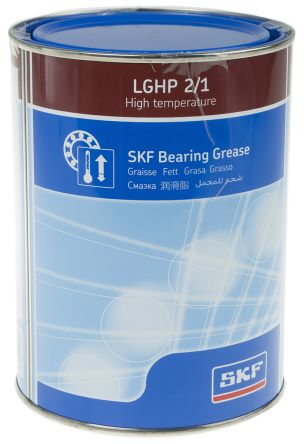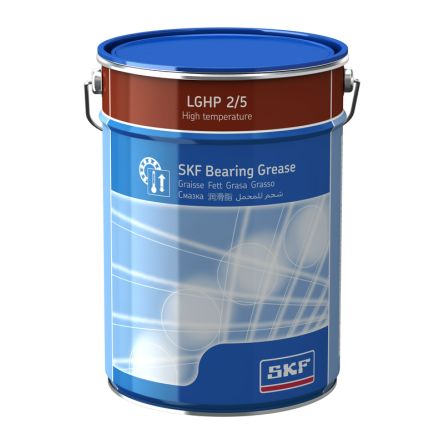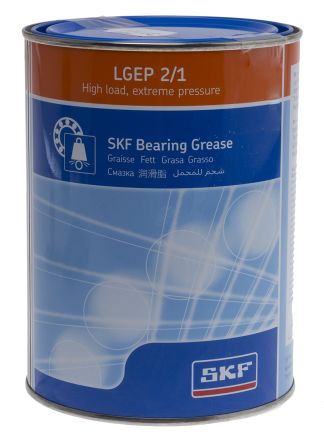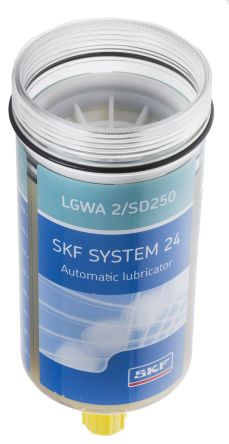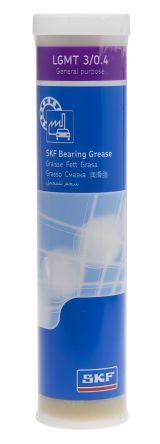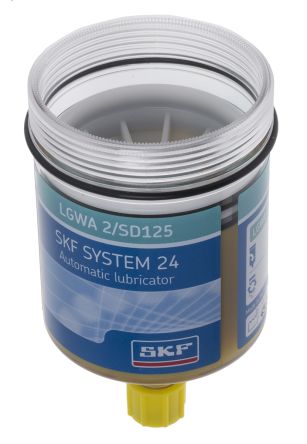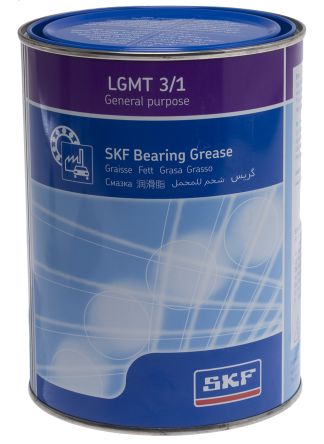- Automation & Control Gear
- Cables & Wires
- Enclosures & Server Racks
- Fuses & Circuit Breakers
- HVAC, Fans & Thermal Management
- Lighting
- Relays & Signal Conditioning
- Switches
- Batteries & Chargers
- Connectors
- Displays & Optoelectronics
- ESD Control, Cleanroom & PCB Prototyping
- Passive Components
- Power Supplies & Transformers
- Raspberry Pi, Arduino, ROCK, STEM Education & Development Tools
- Semiconductors
SKF Greases
Greases are semi-solid lubricants that play a crucial role in various industries and applications. Unlike liquid lubricants, grease lube has a thicker consistency, allowing it to stay in place and provide long-lasting lubrication, even in challenging conditions. Greases are typically used where frequent lubrication is difficult due to inaccessibility, extreme temperatures, high pressures, or worker safety concerns.
Industrial greases are essential for maintaining the smooth operation of machinery, reducing friction and wear between moving parts. As the machine grease heats up, it becomes more viscous, effectively lubricating bearings, gears, chains, and other mechanical components. Greases also help to seal out contaminants, protect against corrosion, and reduce noise and vibration.
For more information on how to choose the right grease for your application, you can read our complete guide to greases.
Different Types of Greases
There are different types of greases in order to ensure suitability for a wide range of applications and to meet different industry requirements:
Aluminium Greases
Aluminium greases are known for their excellent water resistance and high-temperature stability. They are frequently used in food production machinery due to their ability to withstand high temperatures, resist moisture, and provide effective lubrication in demanding environments. This makes them suitable as lubricants for use in bearings, gears, and other components exposed to high temperatures and water or steam.
Silicone (Also Known as Dielectric Grease)
Silicone greases, also known as dielectric grease, are non-conductive and designed for use with sensitive components, such as electronics and electrical connectors. They protect against galvanic corrosion, prevent moisture ingress, and ensure reliable performance of electrical connections. They are often used as lube to lubricate and protect rubber seals and O-rings in electrical applications.
Synthetic Greases
Synthetic greases offer superior performance in extreme temperatures and harsh environments. They are commonly found lubricating rotating parts in industrial machinery, such as bearings, due to their resistance to oxidation, thermal degradation, and breakdown under high pressure. They are often the preferred choice for applications involving high speeds, heavy loads, or wide temperature variations.
Lithium-based Greases
Lithium-based greases are general-purpose greases known for their versatility and wide range of applications. They can often be found in both household and industrial settings, used for lubricating hinges, bearings, gears, and other mechanical components. They are a popular choice for automotive applications, such as chassis lubrication and wheel bearings.
Advantages of Using Greases
Greases offer several advantages over liquid lubricants, making them a preferred choice in many applications. Here are some key benefits of using grease lube:
- Excellent Retention: Greases have a semi-solid consistency that allows them to stay in place, even on vertical surfaces or in areas with high vibration. This excellent retention ensures long-lasting lubrication and reduces the frequency of reapplication.
- Reduced Leakage: The thicker consistency of greases minimises leakage and dripping, making them ideal for applications where lubricant containment is crucial. This is particularly important in machinery with complex or inaccessible lubrication points.
- Contamination Protection: Greases act as a barrier against dirt, dust, and moisture, protecting components from contamination and wear. This is especially beneficial in harsh environments or applications where contaminants could compromise performance or longevity.
- Corrosion Protection: Many machinery greases contain additives that provide corrosion protection, safeguarding metal components from rust and degradation. This helps to extend the life of machinery and equipment.
- Simplified Maintenance: The long-lasting lubrication provided by greases reduces the frequency of maintenance and re-lubrication, saving time and resources. This is particularly advantageous in applications where access to lubrication points is difficult or time-consuming.
- Versatility: Greases are available in a wide variety of formulations to suit different applications and operating conditions, such as high-temperature greases, water-resistant greases, or specialised industrial grease oil.
- Cost-Effectiveness: While the initial cost of grease lube may be higher than some liquid lubricants, the long-lasting lubrication and reduced maintenance requirements can result in overall cost savings over time.
When Would You Need Grease Lubricant?
Greases provide lubrication for moving or rotating parts, providing protection, increasing efficiency and extending operation life. When other lubricants, such as oils, are not suitable for the environment or the materials that require lubrication, greases are used in their place. Greases keep machinery working at their optimal temperature by reducing friction and preventing components from overheating.
Industrial Applications of Greases
Greases are essential lubricants in a wide range of industrial applications, providing reliable performance and protection for machinery and equipment in various industries. Their ability to stay in place, reduce friction, and withstand harsh conditions makes them ideal for various industries. Here are some key examples:
Manufacturing
Industrial greases are vital in manufacturing for lubricating bearings, gears, chains, and other moving parts in machinery and equipment. Machine grease helps to reduce friction, prevent wear, and extend the life of critical components. Different types of greases are used depending on the specific application and operating conditions, such as high temperatures, heavy loads, or exposure to water or chemicals.
Automotive
Greases play a crucial role in the automotive industry, lubricating various components in vehicles, including wheel bearings, chassis, suspension systems, and steering mechanisms. Grease lube helps to ensure smooth operation, reduce noise and vibration, and protect against wear and tear.
Construction
Greases are widely used in construction equipment, lubricating moving parts in excavators, bulldozers, cranes, and other heavy machinery. Machinery grease helps to withstand heavy loads, extreme temperatures, and harsh operating conditions, ensuring reliable performance and extending equipment life.
Mining
Industrial greases are essential in the mining industry for lubricating heavy-duty equipment operating in harsh environments. Greases help to protect against wear, corrosion, and contamination, ensuring reliable operation of mining machinery and reducing downtime.
Agriculture
Greases are used extensively in agricultural equipment, lubricating tractors, harvesters, and other machinery. Grease lube helps to protect against wear, corrosion, and the ingress of dirt and debris, ensuring the smooth operation of agricultural equipment in demanding conditions.
Food Processing
Greases used in food processing must meet strict hygiene and safety standards. Food-grade greases are formulated to be safe for incidental food contact and are used to lubricate machinery and equipment in food processing facilities.
How to Choose the Right Grease Lube
Selecting the appropriate grease lube for your application is crucial for optimal performance, longevity, and cost-effectiveness. Here are some key factors to consider when choosing grease:
- Application: Determine the specific application and the type of machinery or equipment you need to lubricate. Different applications have different requirements, such as load, speed, temperature, and environmental conditions.
- Base Oil Viscosity: Consider the viscosity of the base oil in the grease. Higher viscosity greases are thicker and better suited for heavy loads and slow speeds, while lower viscosity greases are thinner and better for high speeds and lighter loads.
- Thickener Type: Different thickeners are used in grease lube to provide specific properties. Common thickeners include lithium, aluminium, calcium, and polyurea. Each thickener type offers different characteristics in terms of water resistance, temperature resistance, and load-carrying capacity.
- Additives: Greases may contain additives to enhance their performance, such as anti-wear agents, corrosion inhibitors, and oxidation inhibitors. Choose greases with additives that are appropriate for your application and operating conditions.
- NLGI Grade: The National Lubricating Grease Institute (NLGI) has a grading system for machine greases based on their consistency. Grades range from 000 (semi-fluid) to 6 (very hard). Choose the appropriate NLGI grade based on the application and lubrication requirements.
- Operating Temperature: Consider the operating temperature range of your application. Greases have different temperature limits, so choose an industrial grease that can withstand the expected temperatures.
- Environmental Conditions: Consider any environmental factors that may affect the grease, such as water, dust, chemicals, or extreme weather conditions. Choose a grease that offers the necessary protection and resistance.
Trusted Grease Lubricant Manufacturer, Supplier & Distributor in Australia
RS is a leading grease distributor in Australia, offering a comprehensive range of high-quality industrial greases, oil, lube and lubricants from top grease manufacturers like Rocol, SKF, CRC, and more. Our range includes a diverse selection of aluminium, silicone, synthetic, and lithium-based industrial grease. Shop today for fast delivery across Australia. For more details on our delivery services and fees, please visit our Delivery Page.
